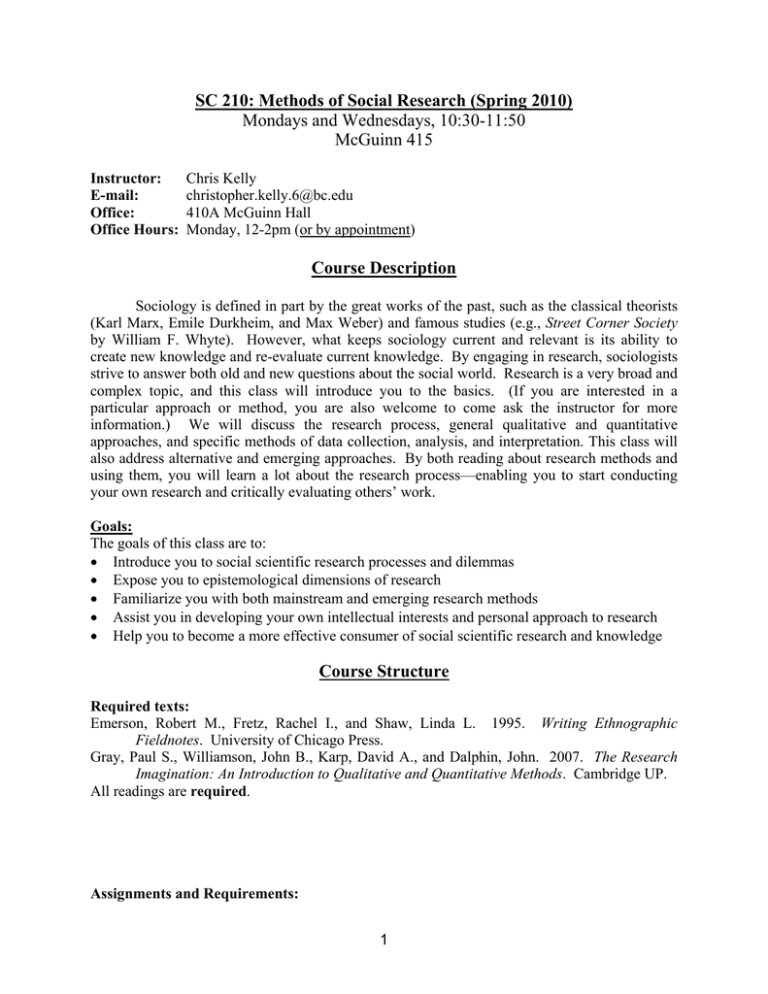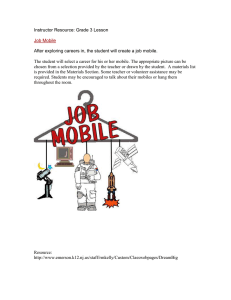SC 210: Methods of Social Research (Spring 2010) Course Description
advertisement

SC 210: Methods of Social Research (Spring 2010) Mondays and Wednesdays, 10:30-11:50 McGuinn 415 Instructor: E-mail: Office: Office Hours: Chris Kelly christopher.kelly.6@bc.edu 410A McGuinn Hall Monday, 12-2pm (or by appointment) Course Description Sociology is defined in part by the great works of the past, such as the classical theorists (Karl Marx, Emile Durkheim, and Max Weber) and famous studies (e.g., Street Corner Society by William F. Whyte). However, what keeps sociology current and relevant is its ability to create new knowledge and re-evaluate current knowledge. By engaging in research, sociologists strive to answer both old and new questions about the social world. Research is a very broad and complex topic, and this class will introduce you to the basics. (If you are interested in a particular approach or method, you are also welcome to come ask the instructor for more information.) We will discuss the research process, general qualitative and quantitative approaches, and specific methods of data collection, analysis, and interpretation. This class will also address alternative and emerging approaches. By both reading about research methods and using them, you will learn a lot about the research process—enabling you to start conducting your own research and critically evaluating others’ work. Goals: The goals of this class are to: • Introduce you to social scientific research processes and dilemmas • Expose you to epistemological dimensions of research • Familiarize you with both mainstream and emerging research methods • Assist you in developing your own intellectual interests and personal approach to research • Help you to become a more effective consumer of social scientific research and knowledge Course Structure Required texts: Emerson, Robert M., Fretz, Rachel I., and Shaw, Linda L. 1995. Writing Ethnographic Fieldnotes. University of Chicago Press. Gray, Paul S., Williamson, John B., Karp, David A., and Dalphin, John. 2007. The Research Imagination: An Introduction to Qualitative and Quantitative Methods. Cambridge UP. All readings are required. Assignments and Requirements: 1 Midterm Exam (20%) Final Exam (20%) Field Notes (10% each – 30% total) Interview (10%) Final Presentation (20%) Participation: Normally, I would make participation a percentage of the grade. However, I feel like any attempt to quantify the participation of so many students would be very arbitrary. Besides, students often do not respond well to forced participation. Thus, participation will be voluntary, and for those who distinguish themselves through frequent participation, I reserve the option to take this into account when assigning final course grades. Topic and Reading Schedule Please have readings completed by the dates shown. Week 1: Introductions January 20: Meet and Greet Week 2: The Logic of Research January 25: Social Science Inquiry Gray et al., Chapters 1 and 2 January 27: Research Design Gray et al., Chapter 3 Week 3: Some Hows and Whys February 1: Ethics of Research Gray et al., Chapter 5 February 3: Measurement Gray et al., Chapter 4 Week 4: Ethnographic Field Research February 8: Introducing Field Research Gray et al., Chapter 9 Emerson et al., Preface and Chapter 1 February 10: Writing Fieldnotes Emerson et al., Chapters 2-3 Week 5: Ethnographic Field Research 2 February 15: Scenes on the Page Emerson et al., Chapter 4 Groups A and C: Notes Set #1 Due February 17: Members’ Perspectives Emerson et al., Chapter 5 Groups B and D: Notes Set #1 Due Week 6: Interviewing February 22: Technique Gray et al., Chapter 8 February 24: Listening Covey, Stephen R. “Chapter 5” from The 7 Habits of Highly Effective People. SPRING BREAK: March 1-5 Week 7: Technical Matters March 8: Sampling Gray et al., Chapter 6 Group A: Notes Set #2 Due March 10: Indices and Scales Gray et al., Chapter 18 Group B: Notes Set #2 Due Week 8: Surveying March 15: Gray et al., Chapter 7 Group C: Notes Set #2 Due March 17: Group D: Notes Set #2 Due Week 9: Experimentation March 22: Gray et al., Chapter 12 Interviews Due March 24: Week 10: Midterm Week 3 March 29: Midterm March 31: Coding and Analyzing Emerson et al, Chapter 6 Group A: Notes Set #3 Due Week 11: Processing Your Notes April 7: Crafting a Story Emerson et al., Chapter 7 and Conclusion Group B: Notes Set #3 Due Week 12: Quantitative Analysis April 12: Chapter 18 Group C: Notes Set #3 Due April 14: Group D: Notes Set #3 Due Week 13: Miscellaneous and Conclusion April 21: Evaluation/Closing Gray et al., Chapter 16 and Epilogue Week 14: April 26: Group #1 Presentation April 28: Group #2 Presentation Week 15: May 3: Group #3 Presentation May 5: Group #4 Presentation Final Exam: May 13, 2010, 12:30 P.M. APPENDIX 4 A Word to the Wise: As one of the required courses in the sociology major, this course will raise various issues, introduce you to a variety of perspectives on the subject matter, challenge you to develop your own ideas, and seek to improve your writing and critical-thinking skills—all at a level far beyond that of a core course. For those reasons, this class is not designed to be easy at all; you will be expected to read and engage with many complicated and often dense texts, discuss and debate those texts with your instructor and fellow students, and write about those texts in papers and on tests. This is not a class in which you can be minimally involved and expect to succeed; you must be intimately engaged at every step! If you do not feel motivated to be this engaged and would prefer more of a “backseat” role, then I highly recommend that you choose another class. I would prefer that you remain, and take up the challenge, but you must decide what is best for you. In short, you should take this class only if you accept the above things and are willing to commit to them! Class Policies: 1. Maturity and Personal Responsibility: In this class, you are expected to behave as the young adults that you are and to take responsibility for yourself accordingly. No one will compel you, through penalties or any other means, to do what you are supposed to do. There will be no penalties for missing class, no pop quizzes to enforce reading, no repeated pleas to turn in assignments due, or anything else. You will be told what is necessary to do well in this class, and you will be allowed to make your own decisions and deal with the consequences, be they good or ill. 2. Attendance: Frequent and responsible attendance to this class is important for two reasons. First, research methods is a complex topic; while you will no doubt learn a lot from the class readings, a lot of information—including “insider information”—will come from the instructor, rather than the readings. To that end, it is important that you are in class to receive additional information not in the readings, as well as clarification of the readings. Second, because social science researchers constitute a community (though broad and sometimes very divided), interaction among researchers is very important. Thus, your own interaction with one another (and with the instructor) is no exception. Attendance will have no effect on your grade, nor is there any official penalty for skipping class. As you are now college students, you are old enough to make your own decisions and to content with their consequences. I will still take attendance for my personal knowledge, and I will keep track of which absences are and are not excused. • For an absence to be excused, you must inform the instructor by e-mail at least 48 hours in advance of your absence and provide some form of documentation afterwards. (If it is an emergency, and you are unable to inform me of your absence in advance, then at least see us afterwards, with appropriate documentation.) • Valid excuses include, but are not limited to o personal illness o illness or death in the family o religious observances 5 • • • o professional reasons If you will be absent for an extended length of time, you or a family member must make arrangements with your associate dean and be sure I am informed of this. You are responsible for contacting a fellow student and/or the instructor and finding out what happened in class while you were absent—including class notes, handouts, and announcements. It is not the instructor’s responsibility to locate you and tell you. As mentioned earlier, absences will not be penalized. However, as I will maintain a record of absences, excused and not, I will take class attendance into account when addressing any problems related to class performance. 3. Writing Policy: Social science writing is written up not just for oneself but for an entire community of social scientists and students—along with anyone else who takes an interest in your respective topics. Therefore, your writing needs to be clear, easy to understand, grammatical, and visually neat. These features are necessary, though not sufficient, in order to get the highest grade possible on your assignments; in other words, points will be deducted for poor writing. In addition, if I find a submitted assignment to have excessive writing problems, I reserve the option to return the assignment and refrain from providing a grade until one of acceptable writing quality is provided. (If the revised assignment is provided past the due date, then it is considered late, and the late work policy would apply.) If you already know that you have difficulty with writing for any reason—unfamiliarity with the rules of English grammar, limited college prep, a learning disability, or anything else—please let the instructor know, ASAP, so that I can communicate with you and help you decide upon an appropriate solution. Finally, Wikipedia is not a source! (This also applies to other encyclopedia-type articles.) You may use a Wikipedia or encyclopedia article to point you towards resources about a topic, but do not cite the article itself in any assignment. 4. Late Work: Work is due at the exact date and time specified. For every day that work is late (excluding Saturdays, Sundays, and school holidays) there will be a 5% deduction from your score, unless you have been granted an extension. Extensions must be requested at least 24 hours before the assignment is due, will only be granted in extenuating circumstances (e.g., student illness, death or serious illness in the family, extensive work due in other classes at the same time), and only with appropriate documentation. 5. E-mail Policy: E-mail is an important method of communication, and it will be a primary medium for this class. • You should check your e-mail at least once per day. • E-mails or announcements relevant to a particular class meeting will be sent no later than 8:00 P.M. before that meeting. If, for some unforeseen reason, an e-mail is sent out after 8:00 P.M. before a class meeting, then you will not be responsible for it for that meeting. • Because the instructor receives a tremendous amount of e-mail, it is easier to keep up with your e-mails about this class if you use appropriate subject lines. The subject line should indicate the class number and the message topic. For example: “SC210: Next Week’s Readings” or “SC210: Absence on Friday 1/16/2010.” The instructor will do the same. Following these recommendations will make communication smoother and more efficient. 6 6. Internet: This class will make use of the Internet for some things, so it is imperative that you know how to use it proficiently. If you have any problem with any aspect of using the Internet in this course, it is your responsibility to bring this problem to my attention immediately. Unfamiliarity with any online aspects of the course will not be accepted as an excuse for failing to complete requirements. 7. Disability: If you have a disability that could affect your class performance or that requires special accommodations, then you must let me know at the beginning of the semester. It is your responsibility to bring this up at the earliest possible moment. 8. Athletics: Student athletes must provide me with all proper documentation and semester game schedules ASAP. 9. Personal Problems: If you have any personal problems or difficulties that might affect your class performance, then you must let me know about this as early as possible. Such problems include, but are not limited to, the following: economic hardship, limited English proficiency, psychological/mental issues, and personal difficulties. 10. Academic Integrity: You are expected to adhere to Boston College’s standards of academic integrity (http://www.bc.edu/integrity) with respect to every aspect of this class. Any cheating, plagiarism, or other kind of academic dishonesty will result in a grade of zero and will be reported to the academic dean. I reserve the option to change aspects of this syllabus, at any time, should circumstances appear to require such. 7


